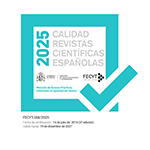Defendiendo el «suave yugo» de «la mal llamada esclavitud»: el Círculo Hispano-Ultramarino de Barcelona (1871-1880).
Resumen
Barcelona fue el lugar elegido por muchos indianos enriquecidos en Cuba y Puerto Rico al instalarse en Europa. Unos indianos que durante el Sexenio Democrático se organizaron en el Círculo Hispano-Ultramarino de dicha ciudad para presionar por el mantenimiento de la esclavitud en ambas Antillas, primero, y para desestabilizar a la I República, después. Aquella entidad fue capaz de implicar en sus campañas antiabolicionistas y proesclavistas a las principales organizaciones económicas catalanas, así como a amplios sectores de las élites de Cataluña, quienes asumieron públicamente sus argumentos participando en plataformas más amplias como la Liga Nacional o la Historia y Política, 49, enero-junio (2023), pp. 217-247
Comisión Defensora de los Intereses de España en Cuba. Y aunque la presión proesclavista no pudo evitar la abolición de la esclavitud en Puerto Rico y en Cuba, sí consiguió alargar su vigencia durante unos años en la Gran Antilla mediante la institución del Patronato. El legado más destacable (y también el más perdurable) del Círculo Hispano-Ultramarino de Barcelona fue el Banco Hispano Colonial, una entidad financiera nacida en 1876 que acabaría transformándose en un verdadero banco de negocios y que gestionaría las aduanas cubanas hasta el final de la dominación española sobre la isla, en 1898.
Descargas
Licencia
Aquellos autores/as que tengan publicaciones con esta revista, aceptan los términos siguientes:
a. Los autores/as conservarán sus derechos de autor y garantizarán a la revista el derecho de primera publicación de su obra, el cuál estará simultáneamente sujeto a la Licencia de reconocimiento de Creative Commons Reconocimiento-No comercial-Sin obra derivada 4.0 España que permite a terceros compartir la obra siempre que se indique su autor y su primera publicación esta revista.
b. Los autores/as podrán adoptar otros acuerdos de licencia no exclusiva de distribución de la versión de la obra publicada (p. ej.: depositarla en un archivo telemático institucional o publicarla en un volumen monográfico) siempre que se indique la publicación inicial en esta revista.
Plagio y fraude científico
La publicación de un trabajo que atente contra los derechos de propiedad intelectual será responsabilidad de los autores/as, que serán los que asuman los conflictos que pudieran tener lugar por razones de derechos de autor. Los conflictos más importantes pueden darse por la comisión de plagios y fraudes científicos.
Se entiende por plagio:
1.Presentar el trabajo ajeno como propio.
2.Adoptar palabras o ideas de otros autores sin el debido reconocimiento.
3.No emplear las comillas u otro formato distintivo en una cita literal.
4.Dar información incorrecta sobre la verdadera fuente de una cita.
5.El parafraseo de una fuente sin mencionar la fuente.
6.El parafraseo abusivo, incluso si se menciona la fuente.
Las prácticas constitutivas de fraude científico son las siguientes:
1.Fabricación, falsificación u omisión de datos y plagio.
2.Publicación duplicada.
3.Conflictos de autoría.












